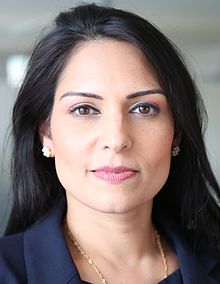Prime Minister Theresa May has announced a new £75 million package over three year programme to tackle the migration crisis and help reduce the number of people risking the perilous Central Mediterranean route to Europe.

Speaking at the European Council in Brussels on Friday 23 June, the Prime Minister confirmed details of the package which will enable voluntary returns and reintegration for those already in transit, get lifesaving food, clean water, medical care and get humanitarian support to those in desperate need, and thereby tackling people trafficking and smuggling.
Taken together, this will not only save lives, but also reduce the need for dangerous journeys and reduce irregular migration, which is also in Britain’s national interest.
The new UK support will initially target transit routes running from the Horn of Africa and West Africa through to countries including Niger, Egypt and particularly Libya, where growing numbers are looking to make the dangerous crossing into Europe. In 2016, a record 181,000 people arrived in Italy via this route, with a greater number expected in 2017. Of the 5,000-plus migrants who died at sea last year, the vast majority, nearly 4,600 lost their lives on this Central Mediterranean route.
The Central Mediterranean migration route includes a risky sea crossing responsible for a record 4,576 people who died or were recorded missing during 2016. Before being able to attempt the sea crossing, migrants face the threat of beatings, sexual violence and forced labour beforehand and an even higher risk of abuse or slavery in Libya. Gruelling routes across the Sahara are also of particular concern – many deaths go unreported, but experts warn these crossings could be claiming a large number of lives.
The commitment announced today builds on existing UK action to tackle the underlying drivers of the migration crisis including conflict, disease and instability, and help create jobs, education and opportunities so that people are able to build a better future for themselves closer to home.
International Development Secretary Priti Patel said: “The UK has been at the forefront of responding to the migration crisis and our work to date has helped reduce total migrant numbers to Europe since 2015. But worryingly, more and more people are now using the incredibly dangerous Central Mediterranean route.
“This new UK support will provide desperately needed aid and protection to tens of thousands of the world’s most vulnerable. But critically it will also make clear the massive risks involved at every stage of this route and provide alternatives so those who change their minds can return home.
“As well as saving lives, this will provide vulnerable people with meaningful alternatives to the treacherous crossings into Europe. Building on our existing work to deal with the root causes of migration, this approach is about using our aid in a smart way, as part of a coordinated approach across Government, to provide protection to people who need it and serve Britain’s national interests.”
The new £75 million package will be delivered over the course of the next three years. It will retain a degree of flexibility to allow prioritisation of emerging needs, but the initial focus will include:
- supporting those who want to return home by facilitating travel and helping with reintegration on their return;
- providing lifesaving food, clean water, and medical care to the most vulnerable refugees and migrants, including those making desert crossings;
- funding to the International Organization for Migration and United Nations High Commission for Refugees’ Emerging Resettlement Country Mechanism, providing financial and technical support to create the necessary infrastructure and systems in countries capable of hosting resettled refugees – this includes countries in Asia and Latin America;
- supporting governments in Africa on transit routes to improve the management of migration and make it safer – for example by improving the capacity to provide protection to asylum seekers and refugees, and to tackle people smuggling and trafficking at a local level; and
- providing flexible funding for unexpected humanitarian needs, such as sudden spikes in the number of arrivals, extreme weather, flooding or outbreaks of disease.










